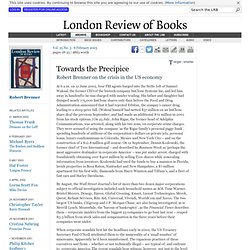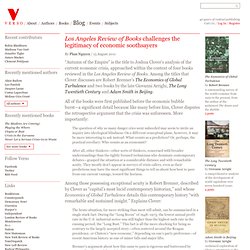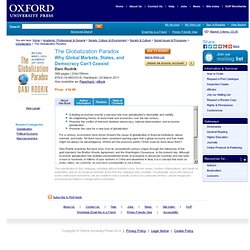

International Political Economy / IR - reading... Debating Varieties of Capitalism: Bob Hancke. Corporate Power and Ownership in Contemporary Capitalism: The Politics of Resistance and Domination. The mind and the market: capitalism in modern European thought - Jerry Z. Muller. Dr Bob Hancké - Dr Bob Hancké - Academic Staff - Staff - European Institute. Dr Bob Hancké Associate Professor (Reader) of Political Economy European Institute Tel: +44 (0)20 7955 6409 Email: r.hancke@lse.ac.uk | Biography Bob Hancké is an Associate Professor (Reader) of Political Economy at the London School of Economics and Political Science.

Previous appointments were at the Wissenschaftszentrum Berlin, and as a PhD candidate at the J.F. Kennedy School and Center for European Studies at Harvard University, and at MIT. Research interests. Bichler - Imperialism and Financialization. Robert Brenner · Towards the Precipice: The Continuing Collapse of the US Economy · LRB 6 February 2003. At 6 a.m. on 12 June 2002, four FBI agents barged into the SoHo loft of Samuel Waksal, the former CEO of the biotech company ImClone Systems Inc, and led him away in handcuffs: he was charged with insider trading.

His father and daughter had dumped nearly 175,000 ImClone shares only days before the Food and Drug Administration announced that it had rejected Erbitux, the compay’s cancer drug, leading to a steep price fall. (Waksal himself had netted $57 million on an ImClone share deal the previous September, and had made an additional $72 million in 2001 from his stock options.) On 25 July, John Rigas, the former head of Adelphia Communications, was arrested, along with his two sons, on corporate crime charges.
When corporate scandals first hit the headlines early in 2002, the US Treasury Secretary Paul O’Neill attributed them to the immorality of a ‘small number’ of miscreants. Apparently he’d been misinformed. But the economy could defy gravity for only so long. LARB challenges legitimacy of economic soothsayers. “Autumn of the Empire” is the title to Joshua Clover’s analysis of the current economic crisis, approached within the context of four books reviewed in the Los Angeles Review of Books.

Among the titles that Clover discusses are Robert Brenner’s The Economics of Global Turbulence and two books by the late Giovanni Arrighi, The Long Twentieth Century and Adam Smith in Beijing. All of the books were first published before the economic bubble burst—a significant detail because like many before him, Clover disputes the retrospective argument that the crisis was unforeseen. More importantly: The question of why so many danger cries went unheeded may seem to invite an inquiry into ideological blindness. Robert Brenner: The Economics of Global Turbulence (Special Issue) New Left Review I/229, May-June 1998 Robert Brenner A commanding survey of the world economy from 1950 to the present, from the author of the acclaimed The Boom and the Bubble.

Originally published as NLR I/229, this is now a Verso book: Order it from the Verso website, or from Amazon US or UK. For years, the discipline of economics has been moving steadily away from the real world towards formalized axioms and mathematical models with only a precarious bearing on actuality. The Economics of Global Turbulence: The Advanced Capitalist Economies from Long Boom to Long Downturn, 1945-2005. The Globalization Paradox: Hardback: Dani Rodrik. A leading economist sounds a warning note over globalization's desirability and viabilityAn enlightening history of world trade and economics over the last century Pinpoints the conflict of interests between democracy, national determination, and economic globalization Presents the case for a new type of globalizationFor a century, economists have driven forward the cause of globalization in financial institutions, labour markets, and trade.

Yet there have been consistent warning signs that a global economy and free trade might not always be advantageous. Where are the pressure points? What could be done about them? Dani Rodrik examines the back-story from its seventeenth-century origins through the milestones of the gold standard, the Bretton Woods Agreement, and the Washington Consensus, to the present day. The heart of Rodrik>'s argument is a fundamental 'trilemma': that we cannot simultaneously pursue democracy, national self-determination, and economic globalization.